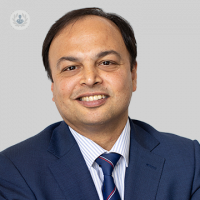Signs of ovarian cyst rupture
Written by:Can anyone develop an ovarian cyst?
Yes, anyone who has an ovary can develop a cyst and they can form at any age. Cysts are fluid-filled sac-like growths. Ovarian cysts can be of many types and can be formed from different tissues in the ovary. They are broadly divided into 2 groups: functional (or physiological) and pathological.
Functional cysts are common and generally resolve on their own and therefore rarely needs treatment. Ovaries are very active organs. Every month small sacs containing eggs, called follicles develop to release eggs (ovulation). Some of these sacs can persist or grow and form functional cysts. They, therefore form after puberty and before menopause. The other type of cysts can form at any age. These can be simple or complex. Complex cysts ideally should be scanned by a specialist experienced in gynaecological ultrasound scanning. These cysts generally need removal, ideally by laparoscopy (keyhole surgery).

Is an ovarian cyst a sign of cancer?
The vast majority of ovarian cysts are benign (i.e. not cancer). However, many ovarian cysts can turn into cancer. The risk of cancer increases with age but can happen at a young age.
What is an ovarian cyst rupture?
Any ovarian cyst can rupture, if, for example, there is a breach in the surface layer of the cyst. This commonly happens in functional cysts, most commonly in the second half of the menstrual cycle (i.e. after ovulation). However, rupture can happen in other types of the cyst as well.
What are the symptoms?
Most commonly the symptoms are sudden onset of severe lower tummy pain. However, gradual onset of dull aching pain on one side of the lower tummy may also be present. The pain may result in nausea, vomiting and can spread becoming more generalised tummy pain. It generally does not go away with simple painkillers like paracetamol. It commonly happens in the second half of the cycle.
Some cysts like dermoid cysts, if ruptures can make one very ill. Sudden severe tummy pain may be a sign of an ovarian cyst torsion (twists on its stalk) which is a very serious emergency often needing urgent surgery to save the ovary. It can also be a sign of other conditions ranging from an ectopic pregnancy (pregnancy outside the womb that can cause life-threatening haemorrhage) to acute appendicitis.
What happens when one bursts?
If it is a functional cyst or simple cyst, mostly it is self-limiting and it resolves spontaneously. However, it may take days for the pain to settle. Many such cysts cause bleeding inside the tummy (that is not visible). Other cysts like dermoid cyst rupture cause peritonitis (inflammation and irritation of the lining of the whole tummy) needing urgent (and often ITU) medical attention. Rarely a cyst containing cancer cell can spread if it ruptures.
How do you know when to seek medical attention?
Sudden onset of severe lower tummy pain, particularly if it is on one side should be investigated by a gynaecologist as soon as possible. Ideally, an internal (transvaginal) ultrasound scan should be performed for diagnosis. Gradual onset of lower tummy pain, persisting or not relieved with simple painkillers should also be investigated.
Ovaries are tiny organs deep inside the lower tummy surrounded by the intestines (bowel). A cyst including those that are cancerous can grow slowly over years without causing significant symptoms. There is no ideal screening test to detect such cysts or cancer.
Yearly ultrasound scans and a blood test are sometimes recommended particularly where there is a strong family history, to identify such cysts.


